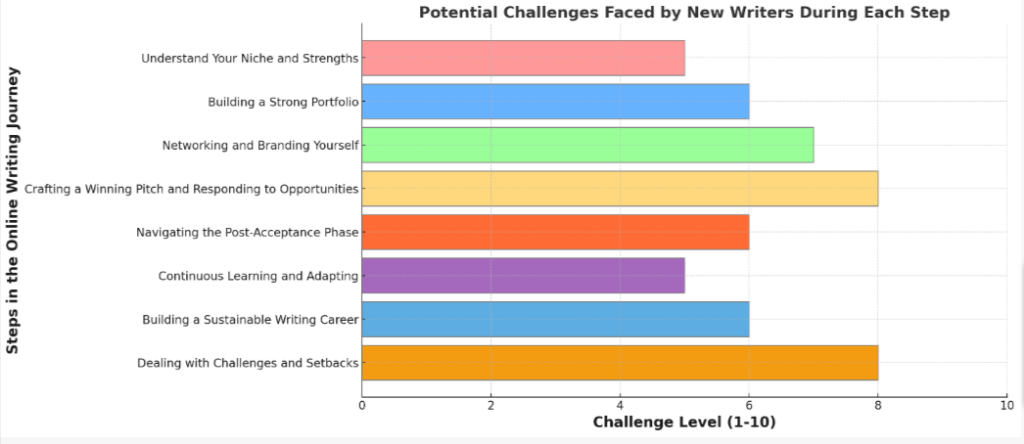Launching Your Digital Writing Career: A Beginner’s Guide
Introduction
In the digital age, where content is king, the demand for skilled online writers has surged to unprecedented levels. From businesses seeking to strengthen their online presence to bloggers wanting to scale their platforms, the opportunities for writers are vast and varied.
However, for many aspiring writers, the most significant challenge lies not in the act of writing but in securing that very first gig. Landing your first online writing job is more than just a monetary gain—it’s a rite of passage. It solidifies your belief in your abilities and sets the foundation for a potentially flourishing online writing career.
But how does one break into this competitive arena? With countless writers vying for the same opportunities, what can you do to stand out and grab the attention of potential clients or publishers? The good news is, while the digital writing landscape is competitive, it’s also expensive. There’s room for everyone, and with the right strategies, you can carve out a space for yourself.
This guide will navigate you through five easy steps, designed to not only help you land your first online writing gig but also instill the confidence and knowledge to continue growing in this dynamic field. Whether you’re a budding writer eager to monetize your skills or someone looking to transition into a writing career, these steps will pave the way for your first of many writing achievements.
Understand Your Niche and Strengths
Diving into the vast ocean of online writing without a clear direction can be both overwhelming and counterproductive. Just as a sailor sets sail with a clear destination in mind, so should a writer embark on their journey with a clear understanding of their niche and strengths. This clarity not only streamlines your approach but also enhances your visibility in the eyes of potential clients.
The Importance of Specialization
The adage “jack-of-all-trades, master of none” holds especially true in the realm of online writing. Clients and publishers are more inclined to trust and hire specialists—those who possess deep knowledge and expertise in a particular domain.
- Why it’s more effective to specialize: Imagine you’re launching a tech startup and need a writer to create content for your website. Would you hire a generalist writer or someone who specializes in tech writing? Naturally, the latter. Specializing allows you to command higher rates, build authority, and attract clients more aligned with your expertise.
- Examples of niche writing areas: From tech, health, and travel to finance, fashion, and food—there’s a niche for every writer. The key is to identify a niche that aligns with both your passion and market demand.
Self-assessment and Skill Identification
Knowing yourself is the first step to showcasing your worth to potential clients. By understanding your strengths, interests, and areas of expertise, you can position yourself more effectively in the market.
- Conducting a self-audit: Reflect on your past experiences, hobbies, courses, and jobs. What topics can you write about with confidence and authenticity? Maybe you’re a fitness enthusiast who can write compelling content about health and wellness. Or perhaps your background in finance makes you an ideal candidate for financial writing gigs.
- Understanding the difference between passion topics and market demand: While it’s crucial to be passionate about your niche, it’s equally vital to ensure there’s a market demand for it. Conduct market research, identify trends, and validate your niche choice.

Developing a Unique Voice
In the crowded digital space, authenticity is your ticket to standing out. Your unique voice and perspective can be your biggest USP (Unique Selling Proposition).
- The role of authenticity and uniqueness: Clients aren’t just buying words—they’re buying perspectives, insights, and unique takes on topics. By cultivating and staying true to your unique voice, you offer something no other writer can.
- Exercises and practices to hone your unique writing style: Engage in free writing sessions, maintain a journal, or take creative writing prompts. Over time, you’ll start to notice patterns, tones, and styles that resonate most with you.
By understanding and leveraging your niche and unique voice, you not only cater to specific market demands but also set yourself apart from the sea of online writers. This distinction is often the difference between being overlooked and being chosen for that coveted first gig.
Building a Strong Portfolio
As an aspiring online writer, your portfolio is the window through which potential clients view your capabilities. It’s more than just a collection of your writings—it’s a testament to your skills, versatility, and commitment to the craft. A well-curated portfolio can be the deciding factor for clients teetering between multiple writers.
Choosing the Right Pieces
Your portfolio should be a representation of both your best work and the kind of work you wish to attract.
- Quality over quantity: It’s better to have five stellar pieces than fifteen mediocre ones. Your portfolio should exude excellence, showcasing your ability to consistently produce high-quality content.
- Ensuring variety while maintaining niche consistency: If you’re a tech writer, for instance, your portfolio can include a product review, a how-to guide, an opinion piece on a recent tech trend, and a detailed technical breakdown. This variety within your niche showcases your versatility.
Using Platforms to Showcase Work
The digital age offers multiple platforms where you can host and display your portfolio, making it accessible to a global audience.
- Benefits of platforms like Medium, WordPress, and LinkedIn:
- Medium: A community-driven platform, Medium allows writers to reach a wider audience, get feedback, and even earn based on the engagement their articles receive.
- WordPress: Ideal for those wanting a personalized touch. You can create a blog or a dedicated portfolio site, showcasing your work and integrating features like contact forms and testimonials.
- LinkedIn: A professional networking platform, LinkedIn lets you share articles, get endorsements, and directly connect with potential clients.
- Creating a personal website: While platforms like Medium are excellent, having a personal website gives you complete control over your branding. It allows for customization, personal domain naming, and lends an added layer of professionalism.
Guest Posting and Collaborations
Guest posting is a powerful way to amplify your reach, build credibility, and add authoritative links to your portfolio.
- How guest posts can boost credibility and visibility: When you guest post on reputable websites or blogs within your niche, you’re essentially borrowing their authority and audience. This not only brings you into the limelight but also builds trust among potential clients.
- Strategies to approach websites or blogs for guest post opportunities: Start by creating a list of niche-relevant websites that accept guest posts. Craft a personalized pitch, clearly detailing what you offer and why you’d be a valuable contributor. Always follow the website’s submission guidelines and be persistent but respectful in your outreach.
A robust portfolio, complemented by guest posts and showcased on the right platforms, acts as a beacon, attracting clients and opportunities directly to you. It speaks volumes before you utter a single word, often making the difference between getting overlooked and getting hired.

Networking and Branding Yourself
The online writing world, much like any other industry, thrives on connections and visibility. While your skills and portfolio play a crucial role, the relationships you foster and the brand you build for yourself can be the catalyst that propels you to your first gig and beyond.
The Power of Networking
Building relationships within the writing community and with potential clients is akin to planting seeds for future opportunities.
- Joining writer’s communities, forums, and groups: Platforms like Writers’ Cafe, Absolute Write, and even specific groups on Facebook and LinkedIn can be goldmines for connections, advice, job postings, and collaborations.
- Attending webinars, workshops, and conventions: Even in the digital age, in-person or virtual events hold significant value. They offer learning opportunities, allow you to meet industry professionals, and often lead to unexpected job offers.
Building an Online Presence
Your online persona plays a pivotal role in how potential clients perceive you. A consistent and professional online presence acts as an ever-active PR agent, promoting your brand around the clock.
- The role of social media in self-branding: Platforms like Twitter, LinkedIn, and Instagram aren’t just for socializing. They can be instrumental in showcasing your expertise, sharing your work, and connecting with clients, editors, and other writers.
- Tips for maintaining consistency and professionalism online: Choose a professional profile picture, use the same handle or name across platforms, engage with industry-relevant content, and refrain from sharing overly controversial or divisive content.
Seeking Mentors and Guidance
No matter how skilled, every writer can benefit from guidance, especially when starting.
- Finding experienced writers willing to mentor or guide: Approach writers you admire, either through their websites or social media. While not everyone will have the time or inclination, many writers appreciate the chance to give back to the community.
- Learning from feedback and constructive criticism: Embrace feedback, even if it’s tough. It’s an opportunity to refine your skills. A mentor or an experienced writer can offer invaluable insights, helping you navigate common pitfalls and enhancing your writing.

In essence, networking and branding aren’t just about promoting yourself. They’re about forging genuine relationships, continuously learning, and creating a consistent and authentic image that resonates with potential clients. By investing time in these areas, you exponentially increase your chances of landing not just your first gig, but many more to come.
Crafting a Winning Pitch and Responding to Opportunities
With a solid understanding of your niche, a robust portfolio, and a growing network, you’re poised to pitch for writing opportunities. This step is often where the rubber meets the road, turning your preparations into tangible job offers.
Understanding the Art of Pitching
Every pitch is your chance to make a stellar first impression, to convince potential clients or publishers that you’re the perfect fit for their needs.
- Personalization is key: Avoid generic pitches. Tailor every proposal to the specific client or publication, demonstrating that you’ve done your homework and understand their needs.
- Convey value: Instead of just talking about your skills or experiences, focus on how you can add value. Maybe your unique perspective can bring fresh insights to a topic, or perhaps your meticulous research skills ensure in-depth, accurate content.
Crafting the Perfect Pitch Email
The pitch email is often your first point of contact, and as such, it needs to be compelling.
- Subject line: Your email’s subject line should be clear, enticing, and relevant. Think of it as a headline—it should capture attention instantly.
- Introduction: Briefly introduce yourself, mentioning any mutual connections if applicable. This can establish trust right off the bat.
- Pitch body: Clearly and concisely state your proposal. Incorporate points that showcase your understanding of their content needs and how you can fulfill them.
- Include samples: Attach or link relevant samples from your portfolio that showcase your capability related to the pitch.
- Closing: End with a call to action, such as expressing a desire to discuss further, and provide your contact details.
Navigating Job Boards and Opportunities
There are numerous job boards and platforms where clients post writing opportunities, and understanding how to navigate these can significantly boost your chances.
- Identifying reputable job boards: Platforms like ProBlogger, BloggingPro, and Freelance Writing Gigs are well-regarded in the writing community, often featuring genuine and well-paying opportunities.
- Responding promptly: The early bird often gets the worm. Regularly checking job boards and responding promptly to new postings can give you an edge.
- Avoiding red flags: Unfortunately, scams are rife in the online job market. Beware of clients who ask for free samples, offer rates that seem too good to be true, or have a history of negative reviews.
The journey to landing your first online writing gig can be riddled with rejection. It’s essential to remember that every ‘no’ brings you closer to a ‘yes’. Use rejections as learning opportunities, refining your pitch and strategy with each attempt. With perseverance, skill, and the strategies outlined above, your dream of landing your first writing job—and many more—will undoubtedly become a reality.
Navigating the Post-Acceptance Phase
Landing your first online writing gig is a moment of elation, but it’s only the beginning. The post-acceptance phase, where you transition from pitching to executing the task, is crucial. This stage not only determines the success of your current gig but can also pave the way for future opportunities.
Effective Communication with Clients
Clear and transparent communication forms the backbone of a successful client-writer relationship.
- Setting expectations: Right from the onset, discuss project specifics such as deadlines, word counts, payment terms, and any other deliverables. This pre-empts potential misunderstandings.
- Being receptive to feedback: As a writer, it’s natural to be protective of your work. However, it’s essential to approach feedback with an open mind and a problem-solving attitude.
- Regular updates: Especially for longer projects, keeping the client updated on your progress builds trust and showcases your professionalism.
Managing Deadlines and Deliverables
Consistency and punctuality can set you apart as a reliable and professional writer.
- Organizational tools: Use tools like Trello, Google Calendar, or Asana to keep track of multiple assignments, deadlines, and client communications.
- Prioritization: Learn to prioritize tasks based on urgency and importance. This ensures that you’re always on top of your assignments, even when juggling multiple projects.
- Seeking extensions: If unforeseen circumstances arise and you believe a deadline might be missed, communicate this to the client as early as possible. Most clients appreciate honesty and proactive communication.
Invoicing and Payment
Handling the financial aspects of a gig professionally is as vital as the writing itself.
- Setting clear payment terms: Before commencing work, ensure you and the client are clear about payment rates, methods, and timelines.
- Using invoicing tools: Platforms like FreshBooks, QuickBooks, or Invoice Ninja can help create professional invoices, track payments, and manage finances.
- Dealing with non-payment or delayed payment: Always approach such situations calmly. Send gentle reminders and understand the reason behind the delay. If the issue persists, consider seeking legal counsel.
Building Long-Term Relationships
A successful gig can often lead to repeat business and referrals.
- Over-delivering: Whenever feasible, aim to exceed client expectations, whether through faster delivery, additional edits, or extra research.
- Follow-ups: After a project’s completion, sending a thank-you note and checking in occasionally can keep you in the client’s radar for future opportunities.
- Seeking testimonials: Positive client feedback can be a valuable addition to your portfolio. Don’t hesitate to ask satisfied clients if they’d be willing to provide a testimonial.
In conclusion, while landing the gig is a significant milestone, the journey post-acceptance holds the key to sustainable success in the online writing world. By handling each project with professionalism, dedication, and a constant desire to add value, you not only cement your reputation but also lay the foundation for a flourishing writing career.
Continuous Learning and Adapting
Even after you’ve successfully landed and executed your first online writing gig, the journey doesn’t stop there. The world of online writing is constantly evolving, and staying updated is essential to remain relevant and competitive. As the old adage goes, “Learning is a never-ending process.”
Staying Updated with Industry Trends
The digital landscape is dynamic, with new trends, platforms, and algorithms emerging regularly.
- Subscribing to industry newsletters: Publications like Writer’s Digest, The Write Life, and Content Marketing Institute offer invaluable insights, tips, and updates.
- Participating in webinars and online courses: Platforms like Coursera, Udemy, and MasterClass offer courses on writing, digital marketing, SEO, and more. Regularly enrolling in these can enhance your skill set.
- Attending industry conferences: While online resources are valuable, nothing beats the immersive experience of conferences. They provide networking opportunities, firsthand insights, and exposure to the latest tools and technologies.
Receiving and Implementing Feedback
Feedback, both positive and constructive, is a goldmine for growth.
- Being open to critiques: Understand that every piece of feedback offers an opportunity to refine your craft.
- Acting on feedback: It’s not just about receiving feedback but implementing it. Review the points made, and consider how you can incorporate those suggestions into your future work.
- Seeking peer reviews: Sometimes, fellow writers can offer perspectives and insights that clients might miss. Consider joining writing groups or forums where members review each other’s work.
Expanding Your Skillset
Diversifying your skills can open up new avenues and opportunities.
- Branching into new writing styles: While you might start as a blog writer, consider exploring copywriting, technical writing, or scriptwriting. Each style has its demand and can enhance your versatility.
- Learning related skills: Skills like basic graphic design, SEO optimization, and content strategy can significantly boost your value proposition to potential clients.
- Adapting to new tools: Familiarize yourself with tools that industry professionals commonly use, such as Grammarly for grammar checks, Hemingway App for readability, and BuzzSumo for content research.
Maintaining Work-Life Balance
As opportunities increase, it’s essential to ensure you don’t burn out.
- Setting clear boundaries: Determine your working hours and stick to them. Inform clients about your availability and be cautious of over-committing.
- Taking breaks: Regular short breaks during work hours can boost productivity. Longer breaks or vacations are essential to recharge and return with renewed vigor.
- Prioritizing health: Physical and mental well-being should always be a priority. Ensure you allocate time for exercise, relaxation, and hobbies.
In summation, while landing your first gig is an exhilarating achievement, maintaining momentum requires continual learning and adaptation. By staying updated with industry changes, being receptive to feedback, expanding your horizons, and ensuring a balanced lifestyle, you ensure that your first gig is just the beginning of a long and fulfilling writing journey.

Building a Sustainable Writing Career
Having tasted success with your first gig and immersed yourself in continuous learning, the next logical step is to think long-term. Transitioning from an occasional gig writer to a full-fledged writing career demands strategy, resilience, and foresight.
Establishing a Brand Identity
Your personal brand differentiates you from the sea of writers out there and makes you memorable to potential clients.
- Personal website and blog: Invest in a professional website showcasing your portfolio, testimonials, and a personal blog where you write on topics that resonate with your niche.
- Consistent branding: Use consistent branding elements across platforms, such as colors, logos, and taglines. This aids in creating a recognizable brand image.
- Active social media presence: Engage actively on platforms like LinkedIn, Twitter, and other relevant channels. Share your work, engage with followers, and establish your expertise.
Diversifying Income Streams
Relying on a single source of income can be risky. Diversifying ensures stability.
- Seeking long-term contracts: While one-off gigs are great, look for opportunities that offer long-term or recurring assignments.
- Branching into affiliate marketing or sponsored content: If you have a blog with decent traffic, these can be lucrative.
- Offering writing-related services: Think about branching into editing, proofreading, or even content strategy consulting.
Setting Long-Term Goals
Having a clear vision of where you want to be can guide your actions and decisions.
- Yearly reviews: Assess your achievements and setbacks for the year. What worked? What didn’t? Use these insights to strategize for the next year.
- Five-year and ten-year plans: Where do you see yourself in five or ten years? A sought-after expert in your niche? A published author? Chart a course towards these goals.
- Continuous skill upgrade: Identify areas of improvement and skills that can elevate your career. Pursue them relentlessly.
Networking and Community Building
Relationships often open doors to opportunities you hadn’t imagined.
- Joining writers’ associations: Organizations like the American Society of Journalists and Authors (ASJA) or the National Writers Union offer opportunities for networking, learning, and even exclusive job boards.
- Attending workshops and meetups: Beyond learning, these provide platforms to connect with peers, mentors, and potential clients.
- Mentoring: As you grow, consider mentoring newer writers. It’s not just about giving back; it can also solidify your position as an industry expert.
Maintaining Consistency
While bursts of success are great, consistency is the key to a sustainable career.
- Regular content creation: Even if you’re not working on a client project, write regularly. It keeps your skills sharp and provides fresh content for your portfolio.
- Client follow-ups: If you haven’t heard from a client in a while, drop a courteous email checking in. It keeps the relationship warm and could lead to new projects.
- Staying updated: Even if you’re at the top of your game, never stop learning. The digital landscape is ever-evolving, and staying updated ensures you remain relevant.
In wrapping up, remember that building a sustainable writing career is a marathon, not a sprint. While the journey will have its highs and lows, with passion, perseverance, and the strategies outlined above, you’re well-equipped to carve a niche for yourself in the vast world of online writing.
Dealing with Challenges and Setbacks
Every profession comes with its set of challenges, and online writing is no exception. As you embark on this journey, it’s essential to anticipate potential hurdles and equip yourself with strategies to overcome them.

Facing Rejection
One of the most frequent challenges writers face is rejection. Whether it’s an article pitch or a manuscript submission, not everything will be accepted.
- Understanding it’s part of the process: Even the most renowned writers have faced rejection. It’s an integral aspect of a writer’s journey and often has nothing to do with your capability.
- Learning from feedback: If a client or editor provides reasons for the rejection, use it constructively to refine your craft.
- Maintaining self-belief: While it’s essential to be receptive to feedback, it’s equally vital to believe in your unique voice and style.
Overcoming Writer’s Block
Every writer, at some point, encounters the dreaded writer’s block.
- Changing your environment: Sometimes, a change of scenery or even a short walk can spark creativity.
- Freewriting: Allocate a specific time daily where you write without any inhibitions or editing. This can unclog mental blocks and lead to unexpected ideas.
- Seeking inspiration: Read articles, watch documentaries, or listen to podcasts. Consuming varied content can reignite your passion and provide fresh perspectives.
Managing Financial Instability
Freelance writing, especially in the initial stages, can have fluctuating income.
- Budgeting: Have a clear understanding of your monthly expenses and save for lean periods. Tools like Mint or YNAB can help manage finances efficiently.
- Diversifying clients: Avoid relying on one major client. Spreading your clientele can mitigate risks associated with sudden project cancellations or payment delays.
- Setting clear payment terms: Always have a contract with clear terms regarding payment amounts, timelines, and recourse in case of non-payment.
Handling Difficult Clients
While many clients are a pleasure to work with, you might occasionally encounter challenging ones.
- Setting clear boundaries: Clearly define the scope of work, revisions included, and additional charges for tasks outside the agreed-upon scope.
- Effective communication: Address issues as they arise. Open dialogue can resolve many misunderstandings before they escalate.
- Knowing when to walk away: If a working relationship becomes too strenuous or undervalues your expertise, consider if it’s worth continuing.
Balancing Multiple Projects
As you gain more clients, managing multiple projects can become overwhelming.
- Time management: Tools like Trello, Notion, or Todoist can help you organize tasks, set priorities, and meet deadlines.
- Setting realistic expectations: It’s tempting to accept every project that comes your way, but overcommitting can lead to burnout and subpar work.
- Allocating buffer time: Always account for unforeseen delays, whether it’s additional research, unexpected revisions, or personal emergencies.
In summary, while the road to a successful online writing career can be filled with challenges, they are not insurmountable. By acknowledging these challenges, arming yourself with strategies to tackle them, and viewing setbacks as learning opportunities, you fortify yourself against the inevitable hurdles and continue to grow and thrive in your chosen profession.

